Comparative Analysis of Anti-Bribery Laws: OECD, US, UK, and Australia
VerifiedAdded on 2020/03/04
|25
|8077
|39
Report
AI Summary
This report analyzes the OECD Convention for Combating Bribery of Foreign Public Officials in International Business Transactions, examining its provisions, limitations, and the approaches of the US, UK, and Australia in addressing bribery. The report explores the convention's obligations on member states, the definition of bribery, and jurisdictional issues. It highlights limitations, such as the omission of passive bribery and the narrow definition of 'foreign public official,' and the lack of effective enforcement mechanisms. The report also discusses the US Foreign Corrupt Practices Act (FCPA), its extra-jurisdictional reach, and its impact on businesses. The analysis includes a comparison of the FCPA with the OECD Convention, focusing on how these legal frameworks aim to protect economic interests and combat corruption in international business. The report further details the limitations of the OECD Convention, including its failure to address passive bribery, its narrow definition of foreign public officials, the omission of bribery of foreign subsidiaries, and the lack of effective enforcement mechanisms. Furthermore, the report also explores the US Foreign Corrupt Practices Act (FCPA) and its extra-jurisdictional reach, and its impact on businesses.
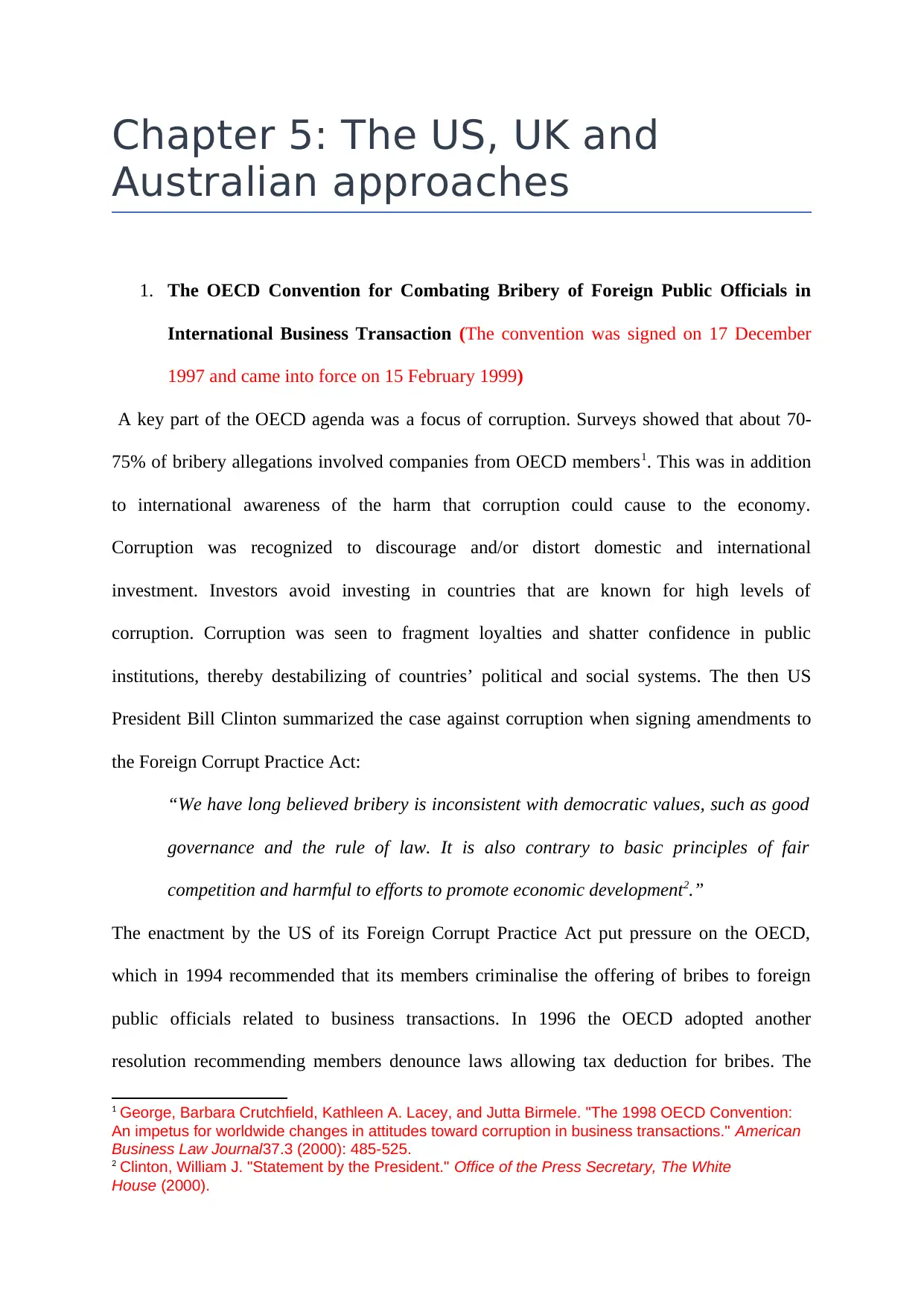
Chapter 5: The US, UK and
Australian approaches
1. The OECD Convention for Combating Bribery of Foreign Public Officials in
International Business Transaction (The convention was signed on 17 December
1997 and came into force on 15 February 1999)
A key part of the OECD agenda was a focus of corruption. Surveys showed that about 70-
75% of bribery allegations involved companies from OECD members1. This was in addition
to international awareness of the harm that corruption could cause to the economy.
Corruption was recognized to discourage and/or distort domestic and international
investment. Investors avoid investing in countries that are known for high levels of
corruption. Corruption was seen to fragment loyalties and shatter confidence in public
institutions, thereby destabilizing of countries’ political and social systems. The then US
President Bill Clinton summarized the case against corruption when signing amendments to
the Foreign Corrupt Practice Act:
“We have long believed bribery is inconsistent with democratic values, such as good
governance and the rule of law. It is also contrary to basic principles of fair
competition and harmful to efforts to promote economic development2.”
The enactment by the US of its Foreign Corrupt Practice Act put pressure on the OECD,
which in 1994 recommended that its members criminalise the offering of bribes to foreign
public officials related to business transactions. In 1996 the OECD adopted another
resolution recommending members denounce laws allowing tax deduction for bribes. The
1 George, Barbara Crutchfield, Kathleen A. Lacey, and Jutta Birmele. "The 1998 OECD Convention:
An impetus for worldwide changes in attitudes toward corruption in business transactions." American
Business Law Journal37.3 (2000): 485-525.
2 Clinton, William J. "Statement by the President." Office of the Press Secretary, The White
House (2000).
Australian approaches
1. The OECD Convention for Combating Bribery of Foreign Public Officials in
International Business Transaction (The convention was signed on 17 December
1997 and came into force on 15 February 1999)
A key part of the OECD agenda was a focus of corruption. Surveys showed that about 70-
75% of bribery allegations involved companies from OECD members1. This was in addition
to international awareness of the harm that corruption could cause to the economy.
Corruption was recognized to discourage and/or distort domestic and international
investment. Investors avoid investing in countries that are known for high levels of
corruption. Corruption was seen to fragment loyalties and shatter confidence in public
institutions, thereby destabilizing of countries’ political and social systems. The then US
President Bill Clinton summarized the case against corruption when signing amendments to
the Foreign Corrupt Practice Act:
“We have long believed bribery is inconsistent with democratic values, such as good
governance and the rule of law. It is also contrary to basic principles of fair
competition and harmful to efforts to promote economic development2.”
The enactment by the US of its Foreign Corrupt Practice Act put pressure on the OECD,
which in 1994 recommended that its members criminalise the offering of bribes to foreign
public officials related to business transactions. In 1996 the OECD adopted another
resolution recommending members denounce laws allowing tax deduction for bribes. The
1 George, Barbara Crutchfield, Kathleen A. Lacey, and Jutta Birmele. "The 1998 OECD Convention:
An impetus for worldwide changes in attitudes toward corruption in business transactions." American
Business Law Journal37.3 (2000): 485-525.
2 Clinton, William J. "Statement by the President." Office of the Press Secretary, The White
House (2000).
Paraphrase This Document
Need a fresh take? Get an instant paraphrase of this document with our AI Paraphraser
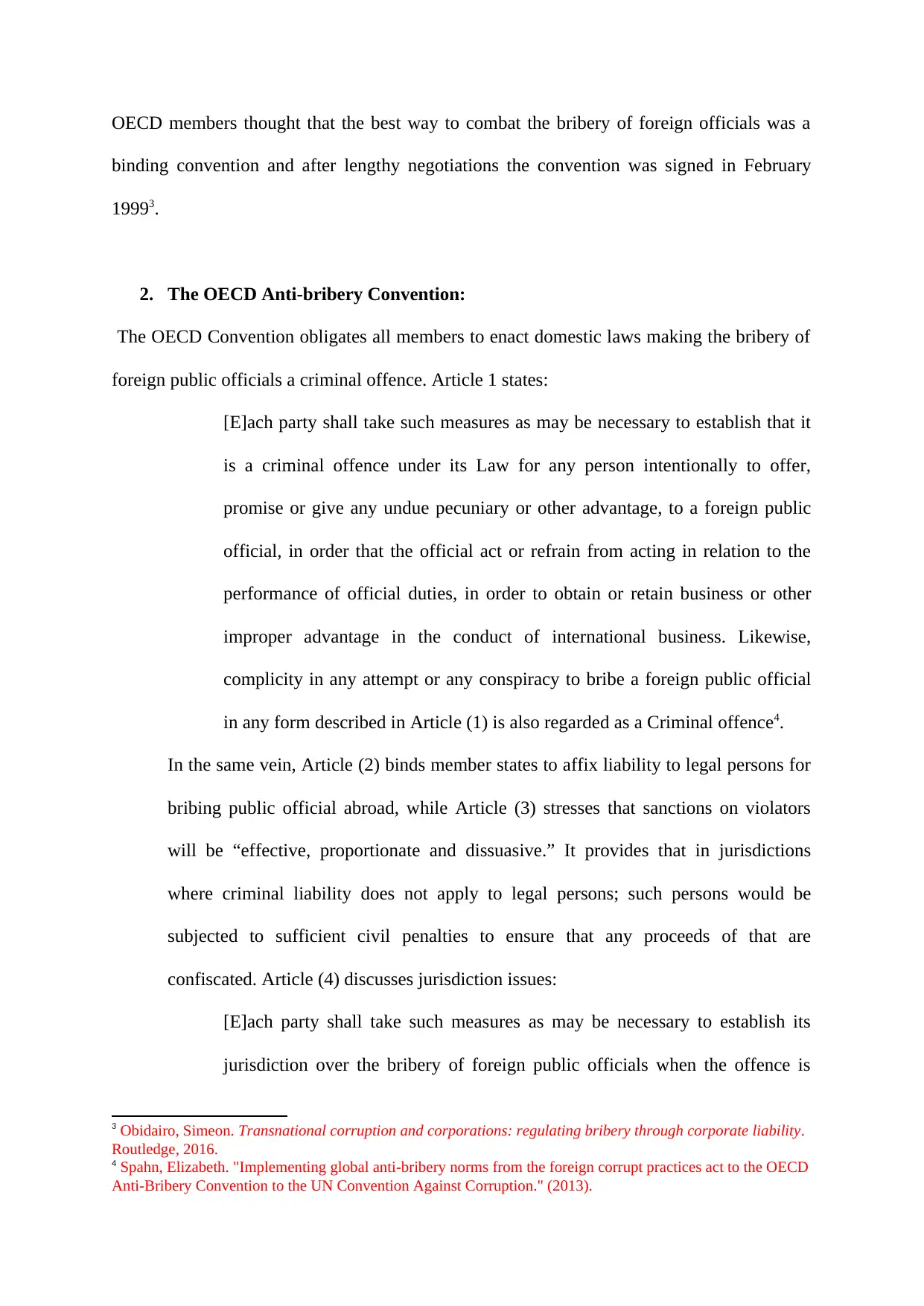
OECD members thought that the best way to combat the bribery of foreign officials was a
binding convention and after lengthy negotiations the convention was signed in February
19993.
2. The OECD Anti-bribery Convention:
The OECD Convention obligates all members to enact domestic laws making the bribery of
foreign public officials a criminal offence. Article 1 states:
[E]ach party shall take such measures as may be necessary to establish that it
is a criminal offence under its Law for any person intentionally to offer,
promise or give any undue pecuniary or other advantage, to a foreign public
official, in order that the official act or refrain from acting in relation to the
performance of official duties, in order to obtain or retain business or other
improper advantage in the conduct of international business. Likewise,
complicity in any attempt or any conspiracy to bribe a foreign public official
in any form described in Article (1) is also regarded as a Criminal offence4.
In the same vein, Article (2) binds member states to affix liability to legal persons for
bribing public official abroad, while Article (3) stresses that sanctions on violators
will be “effective, proportionate and dissuasive.” It provides that in jurisdictions
where criminal liability does not apply to legal persons; such persons would be
subjected to sufficient civil penalties to ensure that any proceeds of that are
confiscated. Article (4) discusses jurisdiction issues:
[E]ach party shall take such measures as may be necessary to establish its
jurisdiction over the bribery of foreign public officials when the offence is
3 Obidairo, Simeon. Transnational corruption and corporations: regulating bribery through corporate liability.
Routledge, 2016.
4 Spahn, Elizabeth. "Implementing global anti-bribery norms from the foreign corrupt practices act to the OECD
Anti-Bribery Convention to the UN Convention Against Corruption." (2013).
binding convention and after lengthy negotiations the convention was signed in February
19993.
2. The OECD Anti-bribery Convention:
The OECD Convention obligates all members to enact domestic laws making the bribery of
foreign public officials a criminal offence. Article 1 states:
[E]ach party shall take such measures as may be necessary to establish that it
is a criminal offence under its Law for any person intentionally to offer,
promise or give any undue pecuniary or other advantage, to a foreign public
official, in order that the official act or refrain from acting in relation to the
performance of official duties, in order to obtain or retain business or other
improper advantage in the conduct of international business. Likewise,
complicity in any attempt or any conspiracy to bribe a foreign public official
in any form described in Article (1) is also regarded as a Criminal offence4.
In the same vein, Article (2) binds member states to affix liability to legal persons for
bribing public official abroad, while Article (3) stresses that sanctions on violators
will be “effective, proportionate and dissuasive.” It provides that in jurisdictions
where criminal liability does not apply to legal persons; such persons would be
subjected to sufficient civil penalties to ensure that any proceeds of that are
confiscated. Article (4) discusses jurisdiction issues:
[E]ach party shall take such measures as may be necessary to establish its
jurisdiction over the bribery of foreign public officials when the offence is
3 Obidairo, Simeon. Transnational corruption and corporations: regulating bribery through corporate liability.
Routledge, 2016.
4 Spahn, Elizabeth. "Implementing global anti-bribery norms from the foreign corrupt practices act to the OECD
Anti-Bribery Convention to the UN Convention Against Corruption." (2013).
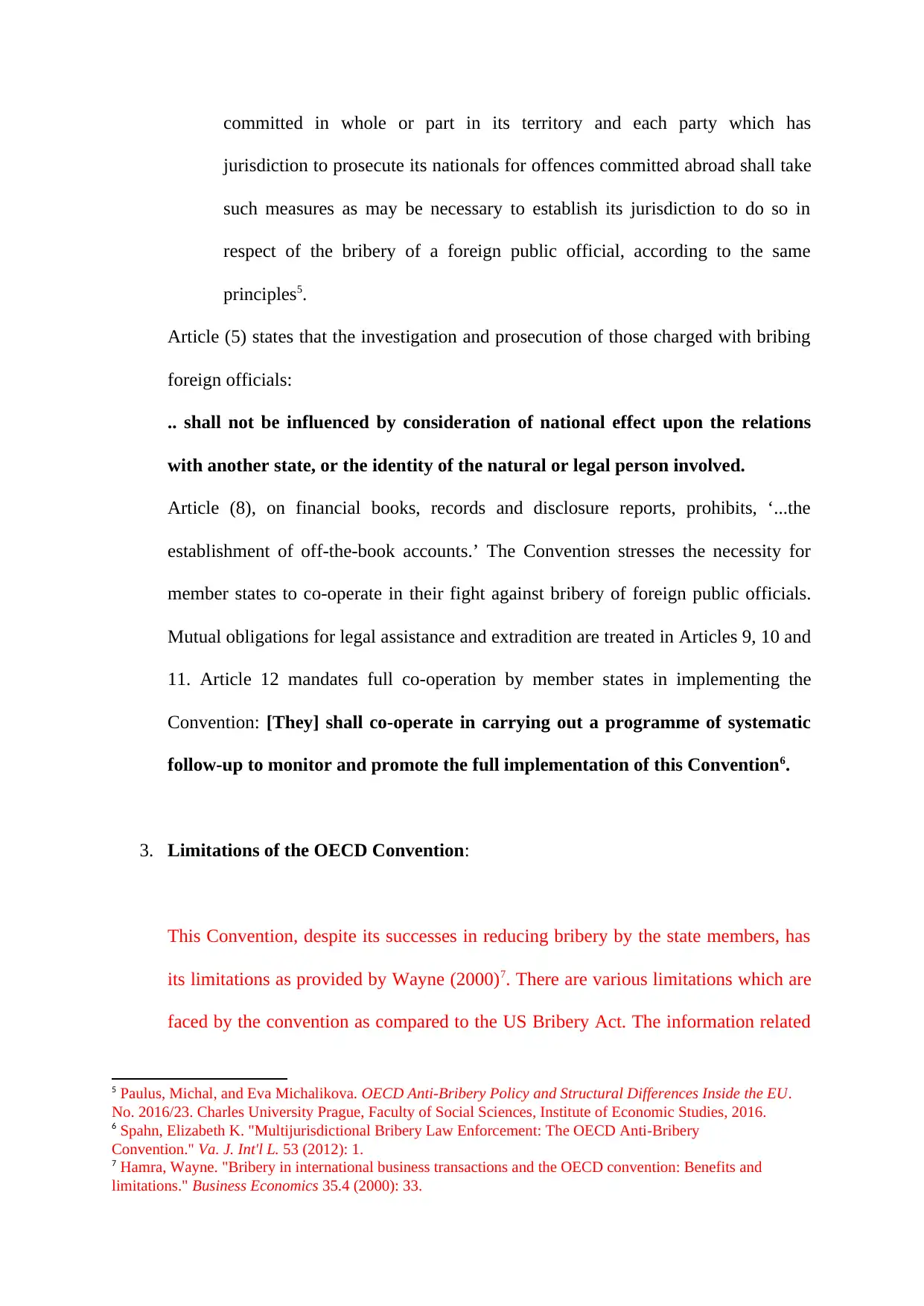
committed in whole or part in its territory and each party which has
jurisdiction to prosecute its nationals for offences committed abroad shall take
such measures as may be necessary to establish its jurisdiction to do so in
respect of the bribery of a foreign public official, according to the same
principles5.
Article (5) states that the investigation and prosecution of those charged with bribing
foreign officials:
.. shall not be influenced by consideration of national effect upon the relations
with another state, or the identity of the natural or legal person involved.
Article (8), on financial books, records and disclosure reports, prohibits, ‘...the
establishment of off-the-book accounts.’ The Convention stresses the necessity for
member states to co-operate in their fight against bribery of foreign public officials.
Mutual obligations for legal assistance and extradition are treated in Articles 9, 10 and
11. Article 12 mandates full co-operation by member states in implementing the
Convention: [They] shall co-operate in carrying out a programme of systematic
follow-up to monitor and promote the full implementation of this Convention6.
3. Limitations of the OECD Convention:
This Convention, despite its successes in reducing bribery by the state members, has
its limitations as provided by Wayne (2000)7. There are various limitations which are
faced by the convention as compared to the US Bribery Act. The information related
5 Paulus, Michal, and Eva Michalikova. OECD Anti-Bribery Policy and Structural Differences Inside the EU.
No. 2016/23. Charles University Prague, Faculty of Social Sciences, Institute of Economic Studies, 2016.
6 Spahn, Elizabeth K. "Multijurisdictional Bribery Law Enforcement: The OECD Anti-Bribery
Convention." Va. J. Int'l L. 53 (2012): 1.
7 Hamra, Wayne. "Bribery in international business transactions and the OECD convention: Benefits and
limitations." Business Economics 35.4 (2000): 33.
jurisdiction to prosecute its nationals for offences committed abroad shall take
such measures as may be necessary to establish its jurisdiction to do so in
respect of the bribery of a foreign public official, according to the same
principles5.
Article (5) states that the investigation and prosecution of those charged with bribing
foreign officials:
.. shall not be influenced by consideration of national effect upon the relations
with another state, or the identity of the natural or legal person involved.
Article (8), on financial books, records and disclosure reports, prohibits, ‘...the
establishment of off-the-book accounts.’ The Convention stresses the necessity for
member states to co-operate in their fight against bribery of foreign public officials.
Mutual obligations for legal assistance and extradition are treated in Articles 9, 10 and
11. Article 12 mandates full co-operation by member states in implementing the
Convention: [They] shall co-operate in carrying out a programme of systematic
follow-up to monitor and promote the full implementation of this Convention6.
3. Limitations of the OECD Convention:
This Convention, despite its successes in reducing bribery by the state members, has
its limitations as provided by Wayne (2000)7. There are various limitations which are
faced by the convention as compared to the US Bribery Act. The information related
5 Paulus, Michal, and Eva Michalikova. OECD Anti-Bribery Policy and Structural Differences Inside the EU.
No. 2016/23. Charles University Prague, Faculty of Social Sciences, Institute of Economic Studies, 2016.
6 Spahn, Elizabeth K. "Multijurisdictional Bribery Law Enforcement: The OECD Anti-Bribery
Convention." Va. J. Int'l L. 53 (2012): 1.
7 Hamra, Wayne. "Bribery in international business transactions and the OECD convention: Benefits and
limitations." Business Economics 35.4 (2000): 33.
⊘ This is a preview!⊘
Do you want full access?
Subscribe today to unlock all pages.

Trusted by 1+ million students worldwide
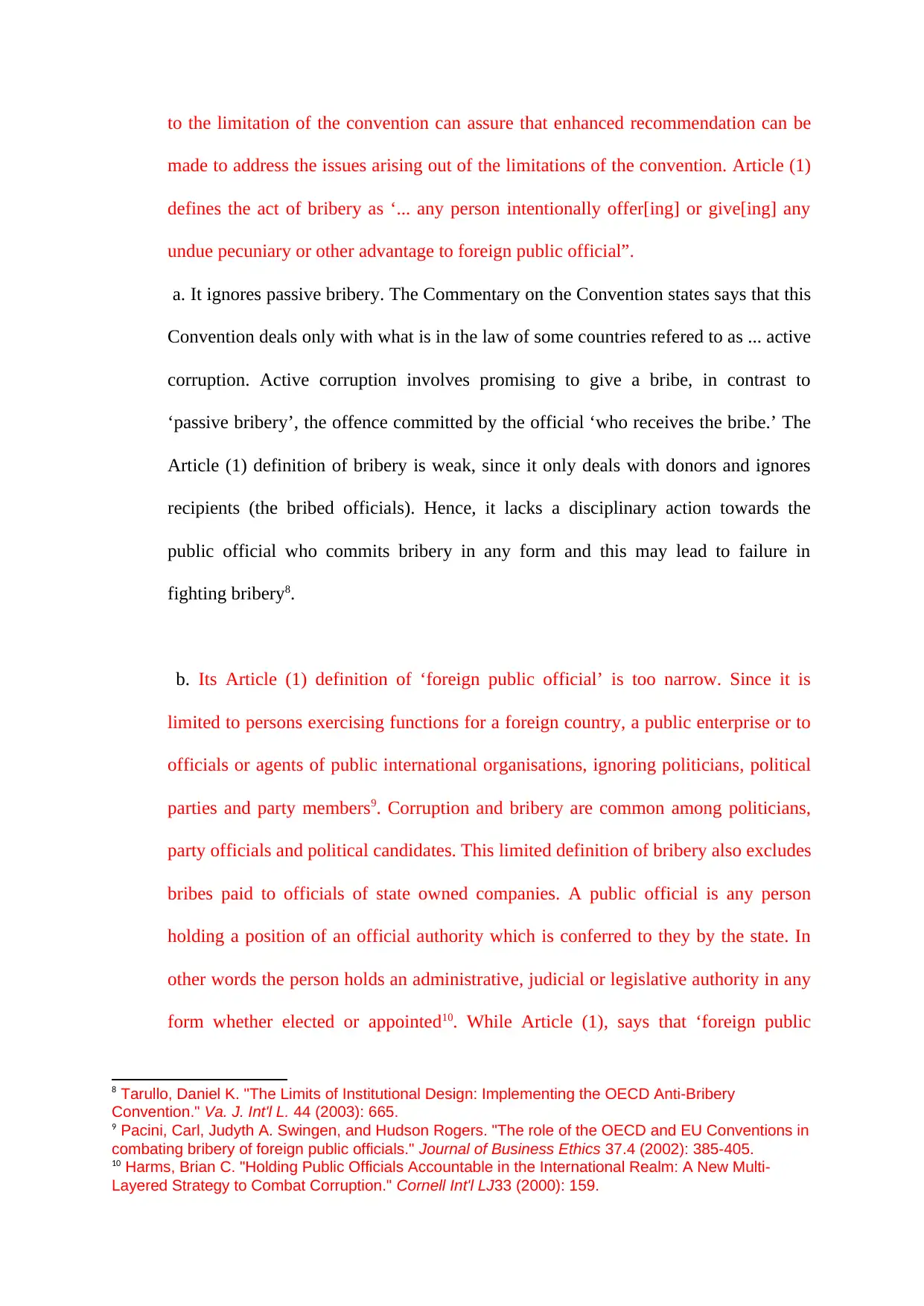
to the limitation of the convention can assure that enhanced recommendation can be
made to address the issues arising out of the limitations of the convention. Article (1)
defines the act of bribery as ‘... any person intentionally offer[ing] or give[ing] any
undue pecuniary or other advantage to foreign public official”.
a. It ignores passive bribery. The Commentary on the Convention states says that this
Convention deals only with what is in the law of some countries refered to as ... active
corruption. Active corruption involves promising to give a bribe, in contrast to
‘passive bribery’, the offence committed by the official ‘who receives the bribe.’ The
Article (1) definition of bribery is weak, since it only deals with donors and ignores
recipients (the bribed officials). Hence, it lacks a disciplinary action towards the
public official who commits bribery in any form and this may lead to failure in
fighting bribery8.
b. Its Article (1) definition of ‘foreign public official’ is too narrow. Since it is
limited to persons exercising functions for a foreign country, a public enterprise or to
officials or agents of public international organisations, ignoring politicians, political
parties and party members9. Corruption and bribery are common among politicians,
party officials and political candidates. This limited definition of bribery also excludes
bribes paid to officials of state owned companies. A public official is any person
holding a position of an official authority which is conferred to they by the state. In
other words the person holds an administrative, judicial or legislative authority in any
form whether elected or appointed10. While Article (1), says that ‘foreign public
8 Tarullo, Daniel K. "The Limits of Institutional Design: Implementing the OECD Anti-Bribery
Convention." Va. J. Int'l L. 44 (2003): 665.
9 Pacini, Carl, Judyth A. Swingen, and Hudson Rogers. "The role of the OECD and EU Conventions in
combating bribery of foreign public officials." Journal of Business Ethics 37.4 (2002): 385-405.
10 Harms, Brian C. "Holding Public Officials Accountable in the International Realm: A New Multi-
Layered Strategy to Combat Corruption." Cornell Int'l LJ33 (2000): 159.
made to address the issues arising out of the limitations of the convention. Article (1)
defines the act of bribery as ‘... any person intentionally offer[ing] or give[ing] any
undue pecuniary or other advantage to foreign public official”.
a. It ignores passive bribery. The Commentary on the Convention states says that this
Convention deals only with what is in the law of some countries refered to as ... active
corruption. Active corruption involves promising to give a bribe, in contrast to
‘passive bribery’, the offence committed by the official ‘who receives the bribe.’ The
Article (1) definition of bribery is weak, since it only deals with donors and ignores
recipients (the bribed officials). Hence, it lacks a disciplinary action towards the
public official who commits bribery in any form and this may lead to failure in
fighting bribery8.
b. Its Article (1) definition of ‘foreign public official’ is too narrow. Since it is
limited to persons exercising functions for a foreign country, a public enterprise or to
officials or agents of public international organisations, ignoring politicians, political
parties and party members9. Corruption and bribery are common among politicians,
party officials and political candidates. This limited definition of bribery also excludes
bribes paid to officials of state owned companies. A public official is any person
holding a position of an official authority which is conferred to they by the state. In
other words the person holds an administrative, judicial or legislative authority in any
form whether elected or appointed10. While Article (1), says that ‘foreign public
8 Tarullo, Daniel K. "The Limits of Institutional Design: Implementing the OECD Anti-Bribery
Convention." Va. J. Int'l L. 44 (2003): 665.
9 Pacini, Carl, Judyth A. Swingen, and Hudson Rogers. "The role of the OECD and EU Conventions in
combating bribery of foreign public officials." Journal of Business Ethics 37.4 (2002): 385-405.
10 Harms, Brian C. "Holding Public Officials Accountable in the International Realm: A New Multi-
Layered Strategy to Combat Corruption." Cornell Int'l LJ33 (2000): 159.
Paraphrase This Document
Need a fresh take? Get an instant paraphrase of this document with our AI Paraphraser
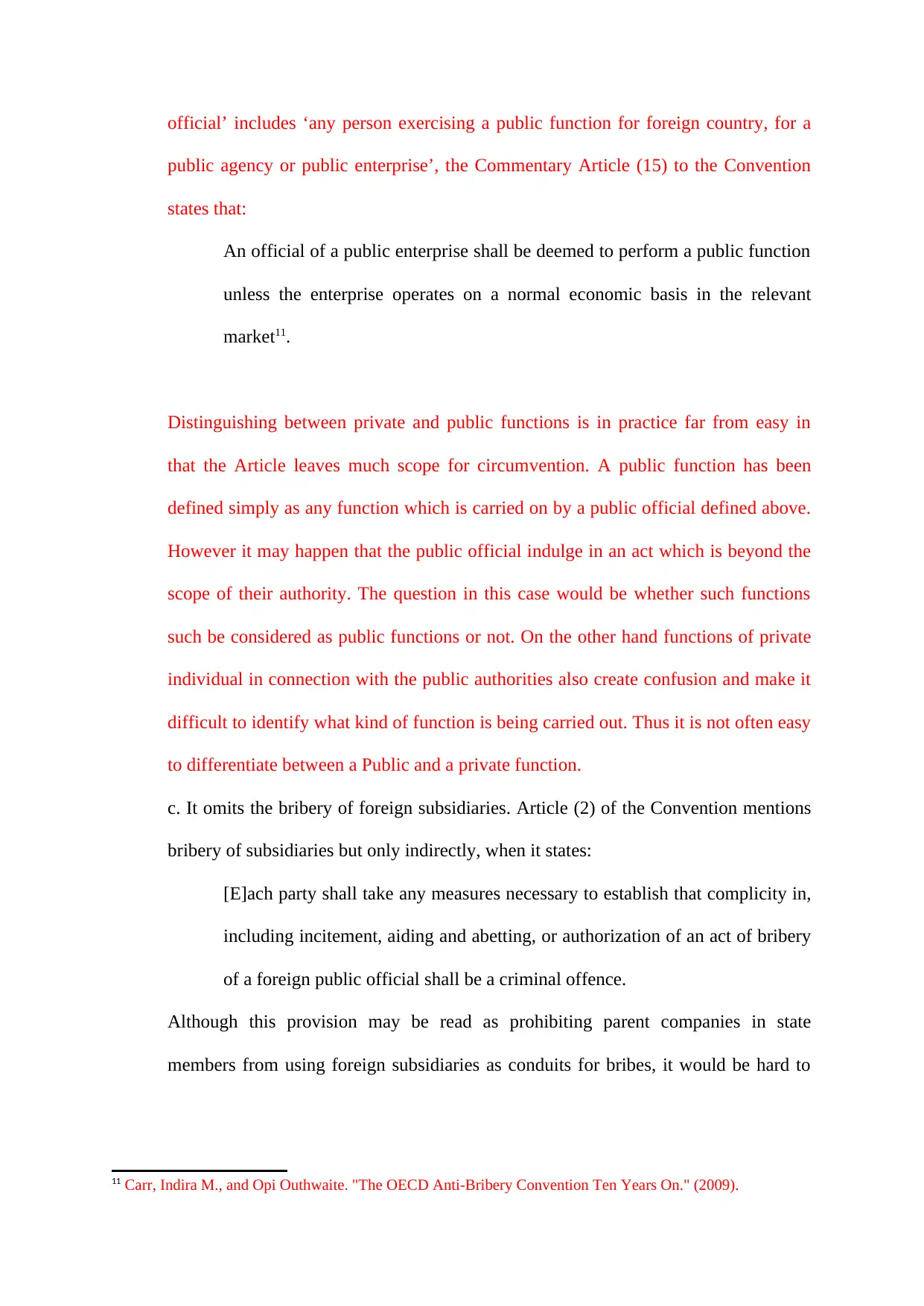
official’ includes ‘any person exercising a public function for foreign country, for a
public agency or public enterprise’, the Commentary Article (15) to the Convention
states that:
An official of a public enterprise shall be deemed to perform a public function
unless the enterprise operates on a normal economic basis in the relevant
market11.
Distinguishing between private and public functions is in practice far from easy in
that the Article leaves much scope for circumvention. A public function has been
defined simply as any function which is carried on by a public official defined above.
However it may happen that the public official indulge in an act which is beyond the
scope of their authority. The question in this case would be whether such functions
such be considered as public functions or not. On the other hand functions of private
individual in connection with the public authorities also create confusion and make it
difficult to identify what kind of function is being carried out. Thus it is not often easy
to differentiate between a Public and a private function.
c. It omits the bribery of foreign subsidiaries. Article (2) of the Convention mentions
bribery of subsidiaries but only indirectly, when it states:
[E]ach party shall take any measures necessary to establish that complicity in,
including incitement, aiding and abetting, or authorization of an act of bribery
of a foreign public official shall be a criminal offence.
Although this provision may be read as prohibiting parent companies in state
members from using foreign subsidiaries as conduits for bribes, it would be hard to
11 Carr, Indira M., and Opi Outhwaite. "The OECD Anti-Bribery Convention Ten Years On." (2009).
public agency or public enterprise’, the Commentary Article (15) to the Convention
states that:
An official of a public enterprise shall be deemed to perform a public function
unless the enterprise operates on a normal economic basis in the relevant
market11.
Distinguishing between private and public functions is in practice far from easy in
that the Article leaves much scope for circumvention. A public function has been
defined simply as any function which is carried on by a public official defined above.
However it may happen that the public official indulge in an act which is beyond the
scope of their authority. The question in this case would be whether such functions
such be considered as public functions or not. On the other hand functions of private
individual in connection with the public authorities also create confusion and make it
difficult to identify what kind of function is being carried out. Thus it is not often easy
to differentiate between a Public and a private function.
c. It omits the bribery of foreign subsidiaries. Article (2) of the Convention mentions
bribery of subsidiaries but only indirectly, when it states:
[E]ach party shall take any measures necessary to establish that complicity in,
including incitement, aiding and abetting, or authorization of an act of bribery
of a foreign public official shall be a criminal offence.
Although this provision may be read as prohibiting parent companies in state
members from using foreign subsidiaries as conduits for bribes, it would be hard to
11 Carr, Indira M., and Opi Outhwaite. "The OECD Anti-Bribery Convention Ten Years On." (2009).
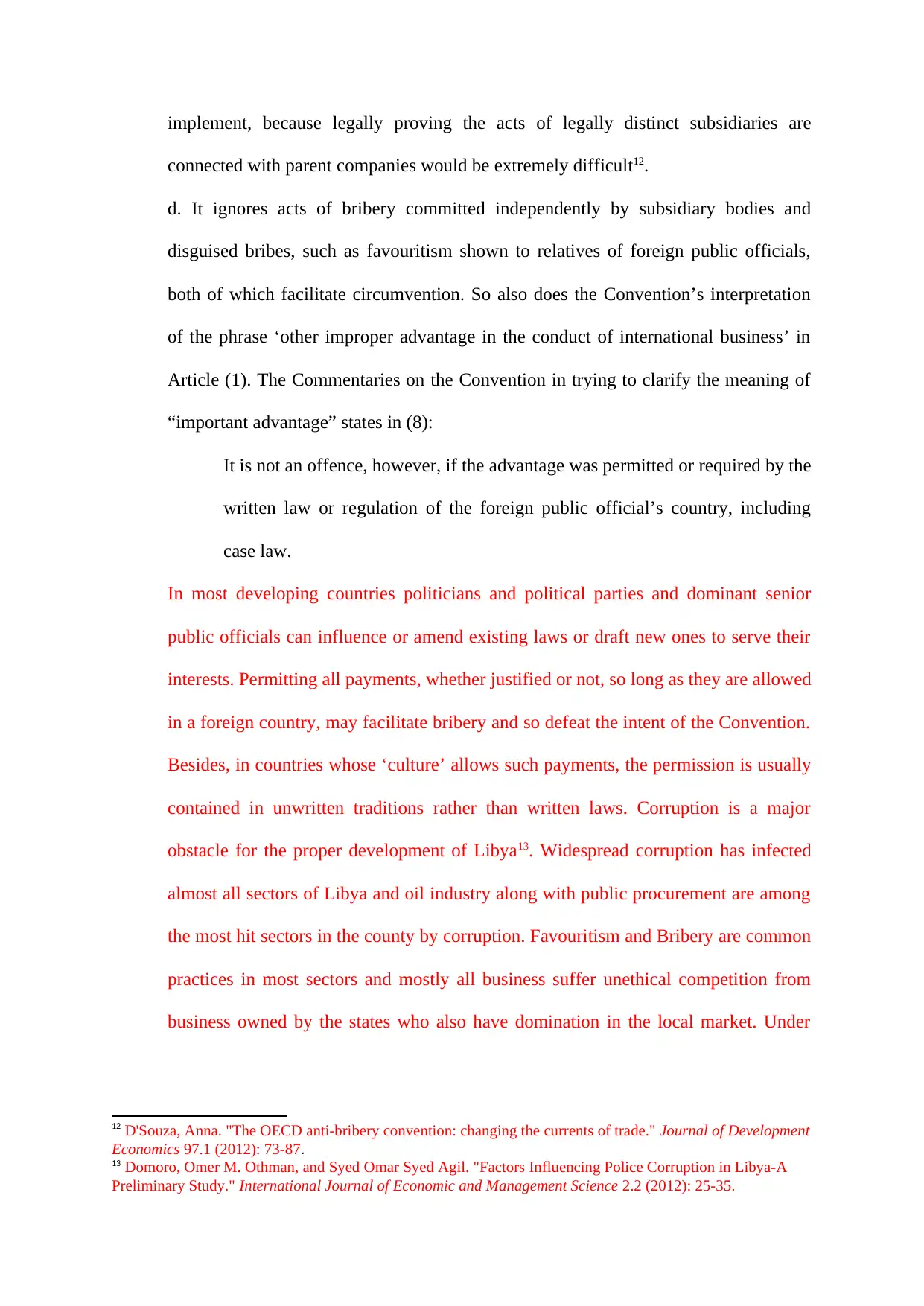
implement, because legally proving the acts of legally distinct subsidiaries are
connected with parent companies would be extremely difficult12.
d. It ignores acts of bribery committed independently by subsidiary bodies and
disguised bribes, such as favouritism shown to relatives of foreign public officials,
both of which facilitate circumvention. So also does the Convention’s interpretation
of the phrase ‘other improper advantage in the conduct of international business’ in
Article (1). The Commentaries on the Convention in trying to clarify the meaning of
“important advantage” states in (8):
It is not an offence, however, if the advantage was permitted or required by the
written law or regulation of the foreign public official’s country, including
case law.
In most developing countries politicians and political parties and dominant senior
public officials can influence or amend existing laws or draft new ones to serve their
interests. Permitting all payments, whether justified or not, so long as they are allowed
in a foreign country, may facilitate bribery and so defeat the intent of the Convention.
Besides, in countries whose ‘culture’ allows such payments, the permission is usually
contained in unwritten traditions rather than written laws. Corruption is a major
obstacle for the proper development of Libya13. Widespread corruption has infected
almost all sectors of Libya and oil industry along with public procurement are among
the most hit sectors in the county by corruption. Favouritism and Bribery are common
practices in most sectors and mostly all business suffer unethical competition from
business owned by the states who also have domination in the local market. Under
12 D'Souza, Anna. "The OECD anti-bribery convention: changing the currents of trade." Journal of Development
Economics 97.1 (2012): 73-87.
13 Domoro, Omer M. Othman, and Syed Omar Syed Agil. "Factors Influencing Police Corruption in Libya-A
Preliminary Study." International Journal of Economic and Management Science 2.2 (2012): 25-35.
connected with parent companies would be extremely difficult12.
d. It ignores acts of bribery committed independently by subsidiary bodies and
disguised bribes, such as favouritism shown to relatives of foreign public officials,
both of which facilitate circumvention. So also does the Convention’s interpretation
of the phrase ‘other improper advantage in the conduct of international business’ in
Article (1). The Commentaries on the Convention in trying to clarify the meaning of
“important advantage” states in (8):
It is not an offence, however, if the advantage was permitted or required by the
written law or regulation of the foreign public official’s country, including
case law.
In most developing countries politicians and political parties and dominant senior
public officials can influence or amend existing laws or draft new ones to serve their
interests. Permitting all payments, whether justified or not, so long as they are allowed
in a foreign country, may facilitate bribery and so defeat the intent of the Convention.
Besides, in countries whose ‘culture’ allows such payments, the permission is usually
contained in unwritten traditions rather than written laws. Corruption is a major
obstacle for the proper development of Libya13. Widespread corruption has infected
almost all sectors of Libya and oil industry along with public procurement are among
the most hit sectors in the county by corruption. Favouritism and Bribery are common
practices in most sectors and mostly all business suffer unethical competition from
business owned by the states who also have domination in the local market. Under
12 D'Souza, Anna. "The OECD anti-bribery convention: changing the currents of trade." Journal of Development
Economics 97.1 (2012): 73-87.
13 Domoro, Omer M. Othman, and Syed Omar Syed Agil. "Factors Influencing Police Corruption in Libya-A
Preliminary Study." International Journal of Economic and Management Science 2.2 (2012): 25-35.
⊘ This is a preview!⊘
Do you want full access?
Subscribe today to unlock all pages.

Trusted by 1+ million students worldwide
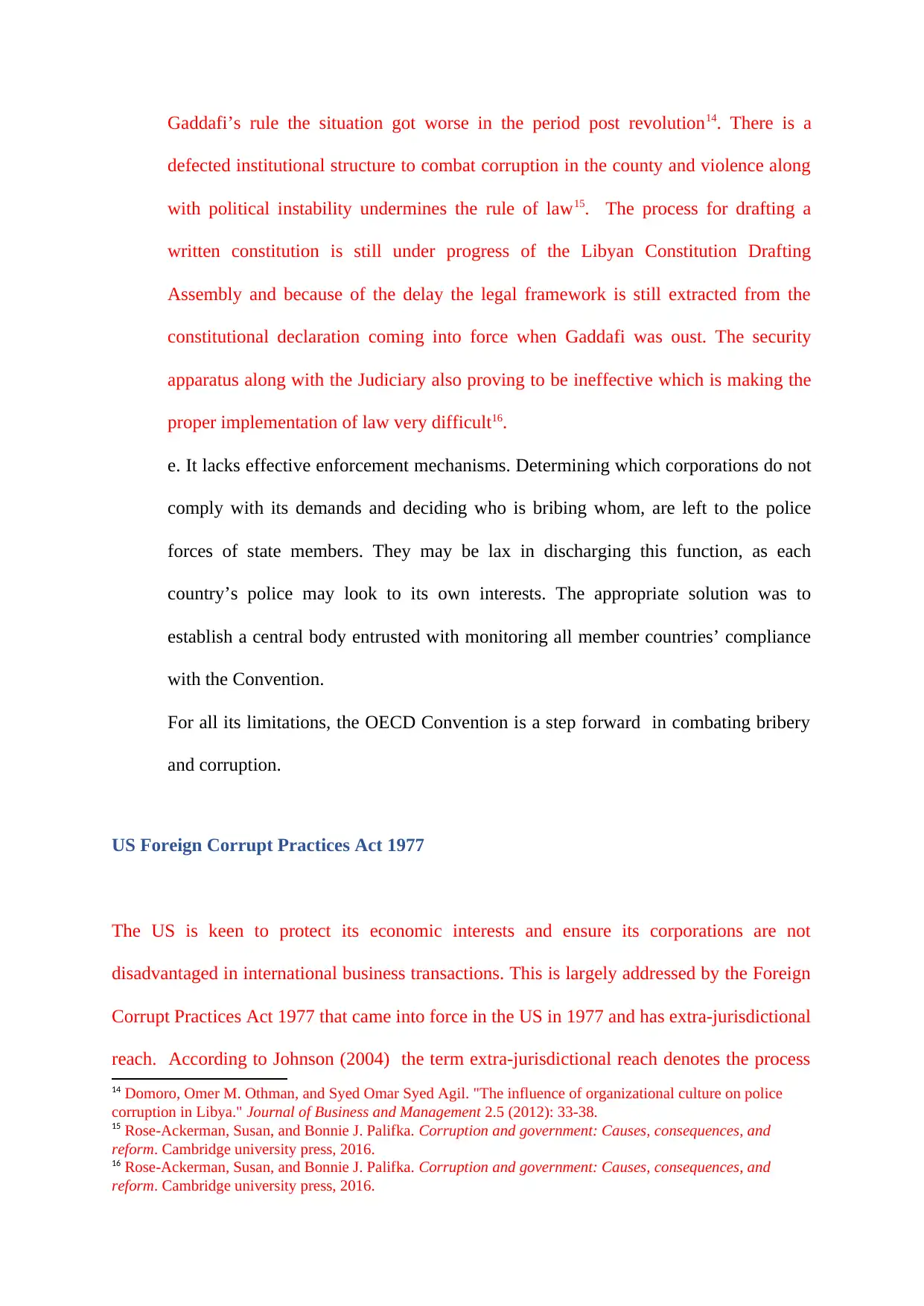
Gaddafi’s rule the situation got worse in the period post revolution14. There is a
defected institutional structure to combat corruption in the county and violence along
with political instability undermines the rule of law15. The process for drafting a
written constitution is still under progress of the Libyan Constitution Drafting
Assembly and because of the delay the legal framework is still extracted from the
constitutional declaration coming into force when Gaddafi was oust. The security
apparatus along with the Judiciary also proving to be ineffective which is making the
proper implementation of law very difficult16.
e. It lacks effective enforcement mechanisms. Determining which corporations do not
comply with its demands and deciding who is bribing whom, are left to the police
forces of state members. They may be lax in discharging this function, as each
country’s police may look to its own interests. The appropriate solution was to
establish a central body entrusted with monitoring all member countries’ compliance
with the Convention.
For all its limitations, the OECD Convention is a step forward in combating bribery
and corruption.
US Foreign Corrupt Practices Act 1977
The US is keen to protect its economic interests and ensure its corporations are not
disadvantaged in international business transactions. This is largely addressed by the Foreign
Corrupt Practices Act 1977 that came into force in the US in 1977 and has extra-jurisdictional
reach. According to Johnson (2004) the term extra-jurisdictional reach denotes the process
14 Domoro, Omer M. Othman, and Syed Omar Syed Agil. "The influence of organizational culture on police
corruption in Libya." Journal of Business and Management 2.5 (2012): 33-38.
15 Rose-Ackerman, Susan, and Bonnie J. Palifka. Corruption and government: Causes, consequences, and
reform. Cambridge university press, 2016.
16 Rose-Ackerman, Susan, and Bonnie J. Palifka. Corruption and government: Causes, consequences, and
reform. Cambridge university press, 2016.
defected institutional structure to combat corruption in the county and violence along
with political instability undermines the rule of law15. The process for drafting a
written constitution is still under progress of the Libyan Constitution Drafting
Assembly and because of the delay the legal framework is still extracted from the
constitutional declaration coming into force when Gaddafi was oust. The security
apparatus along with the Judiciary also proving to be ineffective which is making the
proper implementation of law very difficult16.
e. It lacks effective enforcement mechanisms. Determining which corporations do not
comply with its demands and deciding who is bribing whom, are left to the police
forces of state members. They may be lax in discharging this function, as each
country’s police may look to its own interests. The appropriate solution was to
establish a central body entrusted with monitoring all member countries’ compliance
with the Convention.
For all its limitations, the OECD Convention is a step forward in combating bribery
and corruption.
US Foreign Corrupt Practices Act 1977
The US is keen to protect its economic interests and ensure its corporations are not
disadvantaged in international business transactions. This is largely addressed by the Foreign
Corrupt Practices Act 1977 that came into force in the US in 1977 and has extra-jurisdictional
reach. According to Johnson (2004) the term extra-jurisdictional reach denotes the process
14 Domoro, Omer M. Othman, and Syed Omar Syed Agil. "The influence of organizational culture on police
corruption in Libya." Journal of Business and Management 2.5 (2012): 33-38.
15 Rose-Ackerman, Susan, and Bonnie J. Palifka. Corruption and government: Causes, consequences, and
reform. Cambridge university press, 2016.
16 Rose-Ackerman, Susan, and Bonnie J. Palifka. Corruption and government: Causes, consequences, and
reform. Cambridge university press, 2016.
Paraphrase This Document
Need a fresh take? Get an instant paraphrase of this document with our AI Paraphraser
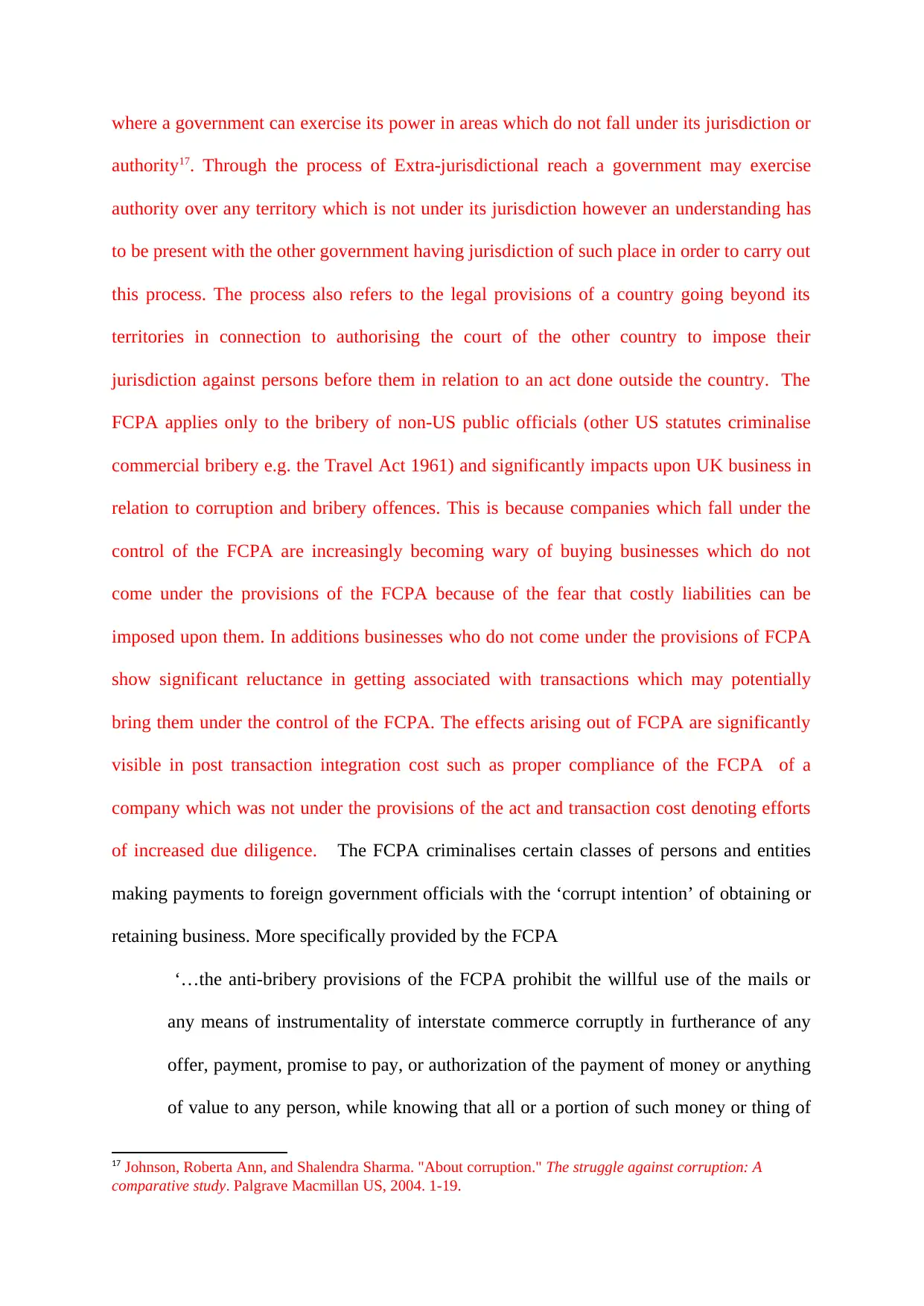
where a government can exercise its power in areas which do not fall under its jurisdiction or
authority17. Through the process of Extra-jurisdictional reach a government may exercise
authority over any territory which is not under its jurisdiction however an understanding has
to be present with the other government having jurisdiction of such place in order to carry out
this process. The process also refers to the legal provisions of a country going beyond its
territories in connection to authorising the court of the other country to impose their
jurisdiction against persons before them in relation to an act done outside the country. The
FCPA applies only to the bribery of non-US public officials (other US statutes criminalise
commercial bribery e.g. the Travel Act 1961) and significantly impacts upon UK business in
relation to corruption and bribery offences. This is because companies which fall under the
control of the FCPA are increasingly becoming wary of buying businesses which do not
come under the provisions of the FCPA because of the fear that costly liabilities can be
imposed upon them. In additions businesses who do not come under the provisions of FCPA
show significant reluctance in getting associated with transactions which may potentially
bring them under the control of the FCPA. The effects arising out of FCPA are significantly
visible in post transaction integration cost such as proper compliance of the FCPA of a
company which was not under the provisions of the act and transaction cost denoting efforts
of increased due diligence. The FCPA criminalises certain classes of persons and entities
making payments to foreign government officials with the ‘corrupt intention’ of obtaining or
retaining business. More specifically provided by the FCPA
‘…the anti-bribery provisions of the FCPA prohibit the willful use of the mails or
any means of instrumentality of interstate commerce corruptly in furtherance of any
offer, payment, promise to pay, or authorization of the payment of money or anything
of value to any person, while knowing that all or a portion of such money or thing of
17 Johnson, Roberta Ann, and Shalendra Sharma. "About corruption." The struggle against corruption: A
comparative study. Palgrave Macmillan US, 2004. 1-19.
authority17. Through the process of Extra-jurisdictional reach a government may exercise
authority over any territory which is not under its jurisdiction however an understanding has
to be present with the other government having jurisdiction of such place in order to carry out
this process. The process also refers to the legal provisions of a country going beyond its
territories in connection to authorising the court of the other country to impose their
jurisdiction against persons before them in relation to an act done outside the country. The
FCPA applies only to the bribery of non-US public officials (other US statutes criminalise
commercial bribery e.g. the Travel Act 1961) and significantly impacts upon UK business in
relation to corruption and bribery offences. This is because companies which fall under the
control of the FCPA are increasingly becoming wary of buying businesses which do not
come under the provisions of the FCPA because of the fear that costly liabilities can be
imposed upon them. In additions businesses who do not come under the provisions of FCPA
show significant reluctance in getting associated with transactions which may potentially
bring them under the control of the FCPA. The effects arising out of FCPA are significantly
visible in post transaction integration cost such as proper compliance of the FCPA of a
company which was not under the provisions of the act and transaction cost denoting efforts
of increased due diligence. The FCPA criminalises certain classes of persons and entities
making payments to foreign government officials with the ‘corrupt intention’ of obtaining or
retaining business. More specifically provided by the FCPA
‘…the anti-bribery provisions of the FCPA prohibit the willful use of the mails or
any means of instrumentality of interstate commerce corruptly in furtherance of any
offer, payment, promise to pay, or authorization of the payment of money or anything
of value to any person, while knowing that all or a portion of such money or thing of
17 Johnson, Roberta Ann, and Shalendra Sharma. "About corruption." The struggle against corruption: A
comparative study. Palgrave Macmillan US, 2004. 1-19.
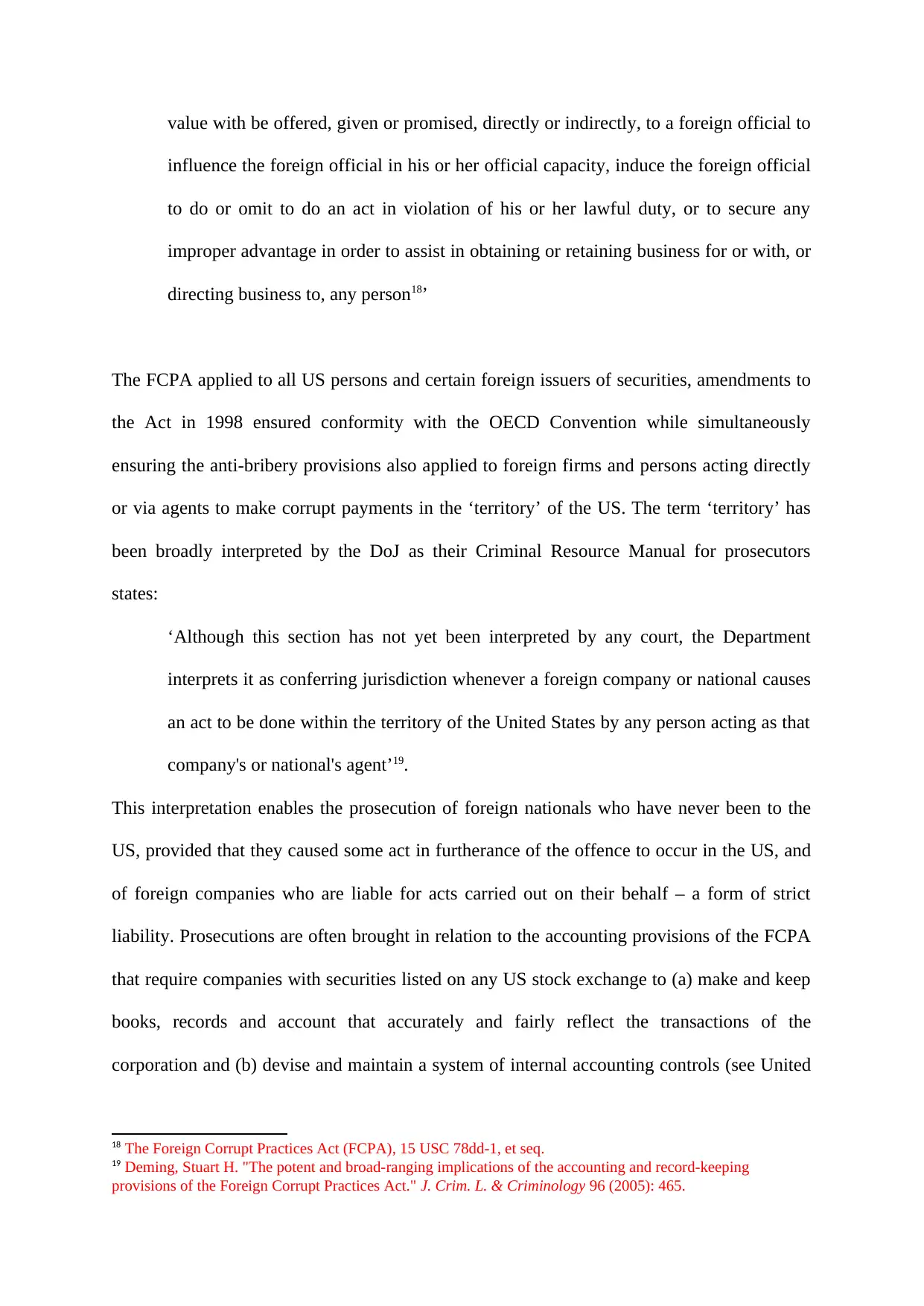
value with be offered, given or promised, directly or indirectly, to a foreign official to
influence the foreign official in his or her official capacity, induce the foreign official
to do or omit to do an act in violation of his or her lawful duty, or to secure any
improper advantage in order to assist in obtaining or retaining business for or with, or
directing business to, any person18’
The FCPA applied to all US persons and certain foreign issuers of securities, amendments to
the Act in 1998 ensured conformity with the OECD Convention while simultaneously
ensuring the anti-bribery provisions also applied to foreign firms and persons acting directly
or via agents to make corrupt payments in the ‘territory’ of the US. The term ‘territory’ has
been broadly interpreted by the DoJ as their Criminal Resource Manual for prosecutors
states:
‘Although this section has not yet been interpreted by any court, the Department
interprets it as conferring jurisdiction whenever a foreign company or national causes
an act to be done within the territory of the United States by any person acting as that
company's or national's agent’19.
This interpretation enables the prosecution of foreign nationals who have never been to the
US, provided that they caused some act in furtherance of the offence to occur in the US, and
of foreign companies who are liable for acts carried out on their behalf – a form of strict
liability. Prosecutions are often brought in relation to the accounting provisions of the FCPA
that require companies with securities listed on any US stock exchange to (a) make and keep
books, records and account that accurately and fairly reflect the transactions of the
corporation and (b) devise and maintain a system of internal accounting controls (see United
18 The Foreign Corrupt Practices Act (FCPA), 15 USC 78dd-1, et seq.
19 Deming, Stuart H. "The potent and broad-ranging implications of the accounting and record-keeping
provisions of the Foreign Corrupt Practices Act." J. Crim. L. & Criminology 96 (2005): 465.
influence the foreign official in his or her official capacity, induce the foreign official
to do or omit to do an act in violation of his or her lawful duty, or to secure any
improper advantage in order to assist in obtaining or retaining business for or with, or
directing business to, any person18’
The FCPA applied to all US persons and certain foreign issuers of securities, amendments to
the Act in 1998 ensured conformity with the OECD Convention while simultaneously
ensuring the anti-bribery provisions also applied to foreign firms and persons acting directly
or via agents to make corrupt payments in the ‘territory’ of the US. The term ‘territory’ has
been broadly interpreted by the DoJ as their Criminal Resource Manual for prosecutors
states:
‘Although this section has not yet been interpreted by any court, the Department
interprets it as conferring jurisdiction whenever a foreign company or national causes
an act to be done within the territory of the United States by any person acting as that
company's or national's agent’19.
This interpretation enables the prosecution of foreign nationals who have never been to the
US, provided that they caused some act in furtherance of the offence to occur in the US, and
of foreign companies who are liable for acts carried out on their behalf – a form of strict
liability. Prosecutions are often brought in relation to the accounting provisions of the FCPA
that require companies with securities listed on any US stock exchange to (a) make and keep
books, records and account that accurately and fairly reflect the transactions of the
corporation and (b) devise and maintain a system of internal accounting controls (see United
18 The Foreign Corrupt Practices Act (FCPA), 15 USC 78dd-1, et seq.
19 Deming, Stuart H. "The potent and broad-ranging implications of the accounting and record-keeping
provisions of the Foreign Corrupt Practices Act." J. Crim. L. & Criminology 96 (2005): 465.
⊘ This is a preview!⊘
Do you want full access?
Subscribe today to unlock all pages.

Trusted by 1+ million students worldwide
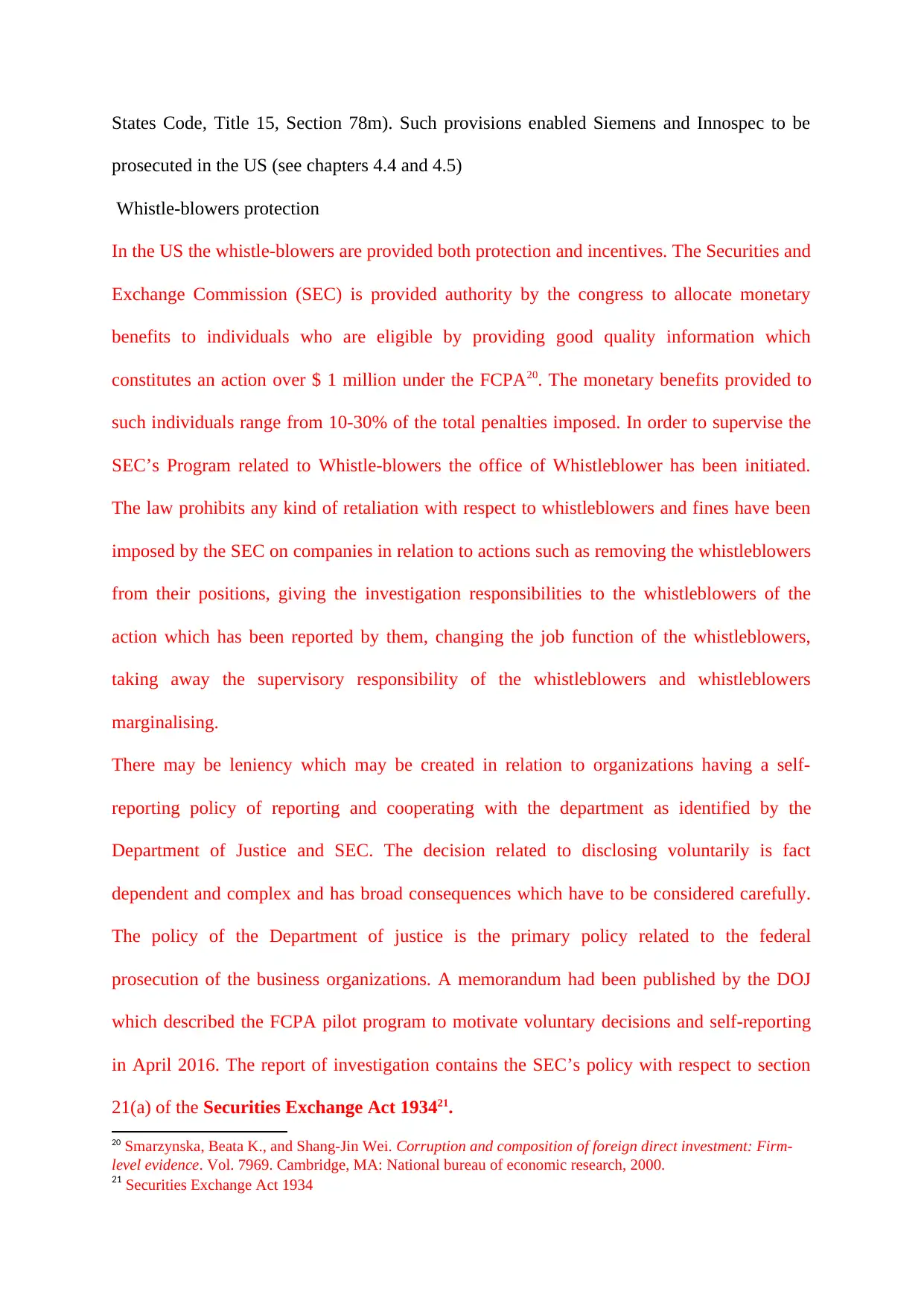
States Code, Title 15, Section 78m). Such provisions enabled Siemens and Innospec to be
prosecuted in the US (see chapters 4.4 and 4.5)
Whistle-blowers protection
In the US the whistle-blowers are provided both protection and incentives. The Securities and
Exchange Commission (SEC) is provided authority by the congress to allocate monetary
benefits to individuals who are eligible by providing good quality information which
constitutes an action over $ 1 million under the FCPA20. The monetary benefits provided to
such individuals range from 10-30% of the total penalties imposed. In order to supervise the
SEC’s Program related to Whistle-blowers the office of Whistleblower has been initiated.
The law prohibits any kind of retaliation with respect to whistleblowers and fines have been
imposed by the SEC on companies in relation to actions such as removing the whistleblowers
from their positions, giving the investigation responsibilities to the whistleblowers of the
action which has been reported by them, changing the job function of the whistleblowers,
taking away the supervisory responsibility of the whistleblowers and whistleblowers
marginalising.
There may be leniency which may be created in relation to organizations having a self-
reporting policy of reporting and cooperating with the department as identified by the
Department of Justice and SEC. The decision related to disclosing voluntarily is fact
dependent and complex and has broad consequences which have to be considered carefully.
The policy of the Department of justice is the primary policy related to the federal
prosecution of the business organizations. A memorandum had been published by the DOJ
which described the FCPA pilot program to motivate voluntary decisions and self-reporting
in April 2016. The report of investigation contains the SEC’s policy with respect to section
21(a) of the Securities Exchange Act 193421.
20 Smarzynska, Beata K., and Shang-Jin Wei. Corruption and composition of foreign direct investment: Firm-
level evidence. Vol. 7969. Cambridge, MA: National bureau of economic research, 2000.
21 Securities Exchange Act 1934
prosecuted in the US (see chapters 4.4 and 4.5)
Whistle-blowers protection
In the US the whistle-blowers are provided both protection and incentives. The Securities and
Exchange Commission (SEC) is provided authority by the congress to allocate monetary
benefits to individuals who are eligible by providing good quality information which
constitutes an action over $ 1 million under the FCPA20. The monetary benefits provided to
such individuals range from 10-30% of the total penalties imposed. In order to supervise the
SEC’s Program related to Whistle-blowers the office of Whistleblower has been initiated.
The law prohibits any kind of retaliation with respect to whistleblowers and fines have been
imposed by the SEC on companies in relation to actions such as removing the whistleblowers
from their positions, giving the investigation responsibilities to the whistleblowers of the
action which has been reported by them, changing the job function of the whistleblowers,
taking away the supervisory responsibility of the whistleblowers and whistleblowers
marginalising.
There may be leniency which may be created in relation to organizations having a self-
reporting policy of reporting and cooperating with the department as identified by the
Department of Justice and SEC. The decision related to disclosing voluntarily is fact
dependent and complex and has broad consequences which have to be considered carefully.
The policy of the Department of justice is the primary policy related to the federal
prosecution of the business organizations. A memorandum had been published by the DOJ
which described the FCPA pilot program to motivate voluntary decisions and self-reporting
in April 2016. The report of investigation contains the SEC’s policy with respect to section
21(a) of the Securities Exchange Act 193421.
20 Smarzynska, Beata K., and Shang-Jin Wei. Corruption and composition of foreign direct investment: Firm-
level evidence. Vol. 7969. Cambridge, MA: National bureau of economic research, 2000.
21 Securities Exchange Act 1934
Paraphrase This Document
Need a fresh take? Get an instant paraphrase of this document with our AI Paraphraser
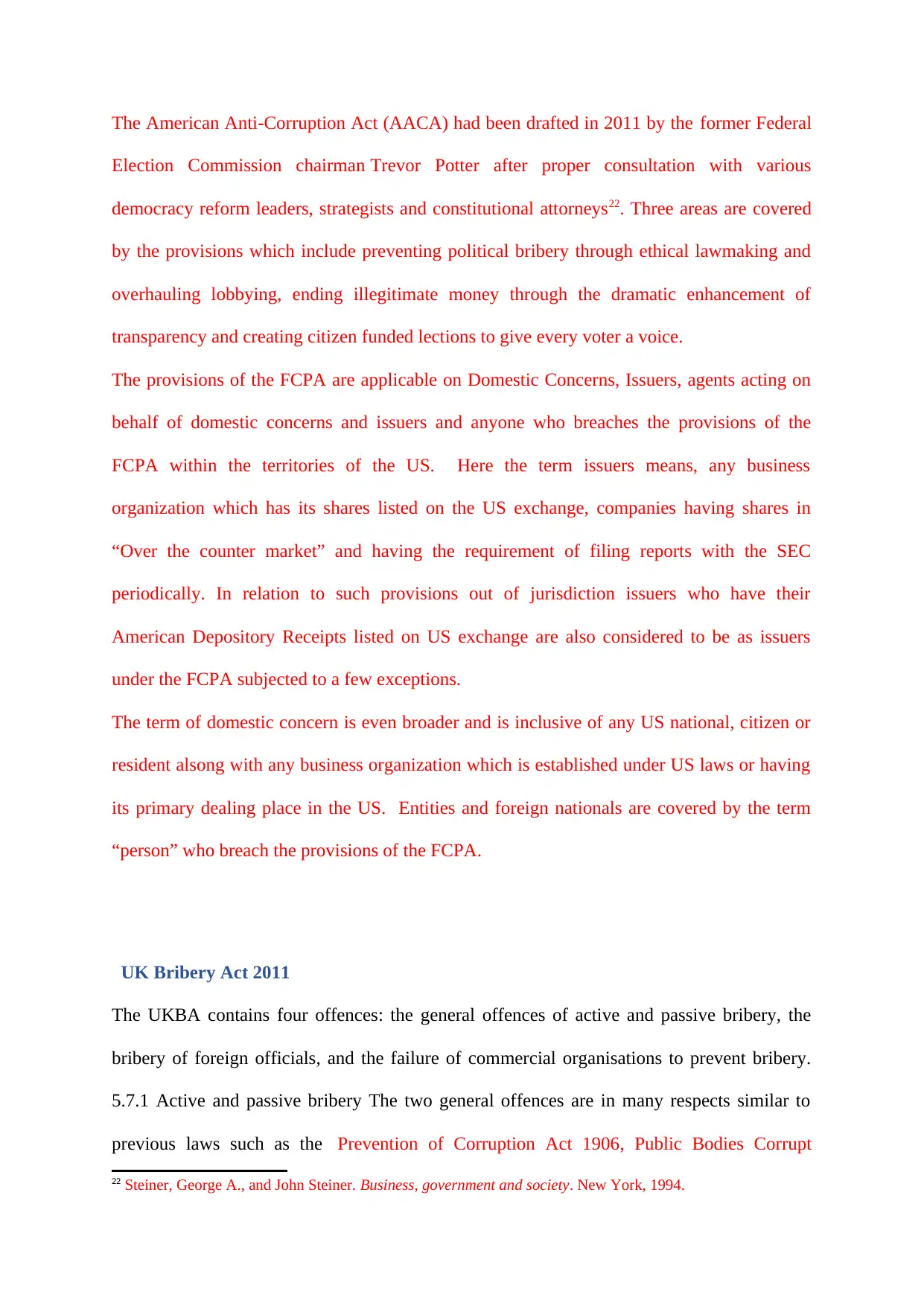
The American Anti-Corruption Act (AACA) had been drafted in 2011 by the former Federal
Election Commission chairman Trevor Potter after proper consultation with various
democracy reform leaders, strategists and constitutional attorneys22. Three areas are covered
by the provisions which include preventing political bribery through ethical lawmaking and
overhauling lobbying, ending illegitimate money through the dramatic enhancement of
transparency and creating citizen funded lections to give every voter a voice.
The provisions of the FCPA are applicable on Domestic Concerns, Issuers, agents acting on
behalf of domestic concerns and issuers and anyone who breaches the provisions of the
FCPA within the territories of the US. Here the term issuers means, any business
organization which has its shares listed on the US exchange, companies having shares in
“Over the counter market” and having the requirement of filing reports with the SEC
periodically. In relation to such provisions out of jurisdiction issuers who have their
American Depository Receipts listed on US exchange are also considered to be as issuers
under the FCPA subjected to a few exceptions.
The term of domestic concern is even broader and is inclusive of any US national, citizen or
resident alsong with any business organization which is established under US laws or having
its primary dealing place in the US. Entities and foreign nationals are covered by the term
“person” who breach the provisions of the FCPA.
UK Bribery Act 2011
The UKBA contains four offences: the general offences of active and passive bribery, the
bribery of foreign officials, and the failure of commercial organisations to prevent bribery.
5.7.1 Active and passive bribery The two general offences are in many respects similar to
previous laws such as the Prevention of Corruption Act 1906, Public Bodies Corrupt
22 Steiner, George A., and John Steiner. Business, government and society. New York, 1994.
Election Commission chairman Trevor Potter after proper consultation with various
democracy reform leaders, strategists and constitutional attorneys22. Three areas are covered
by the provisions which include preventing political bribery through ethical lawmaking and
overhauling lobbying, ending illegitimate money through the dramatic enhancement of
transparency and creating citizen funded lections to give every voter a voice.
The provisions of the FCPA are applicable on Domestic Concerns, Issuers, agents acting on
behalf of domestic concerns and issuers and anyone who breaches the provisions of the
FCPA within the territories of the US. Here the term issuers means, any business
organization which has its shares listed on the US exchange, companies having shares in
“Over the counter market” and having the requirement of filing reports with the SEC
periodically. In relation to such provisions out of jurisdiction issuers who have their
American Depository Receipts listed on US exchange are also considered to be as issuers
under the FCPA subjected to a few exceptions.
The term of domestic concern is even broader and is inclusive of any US national, citizen or
resident alsong with any business organization which is established under US laws or having
its primary dealing place in the US. Entities and foreign nationals are covered by the term
“person” who breach the provisions of the FCPA.
UK Bribery Act 2011
The UKBA contains four offences: the general offences of active and passive bribery, the
bribery of foreign officials, and the failure of commercial organisations to prevent bribery.
5.7.1 Active and passive bribery The two general offences are in many respects similar to
previous laws such as the Prevention of Corruption Act 1906, Public Bodies Corrupt
22 Steiner, George A., and John Steiner. Business, government and society. New York, 1994.
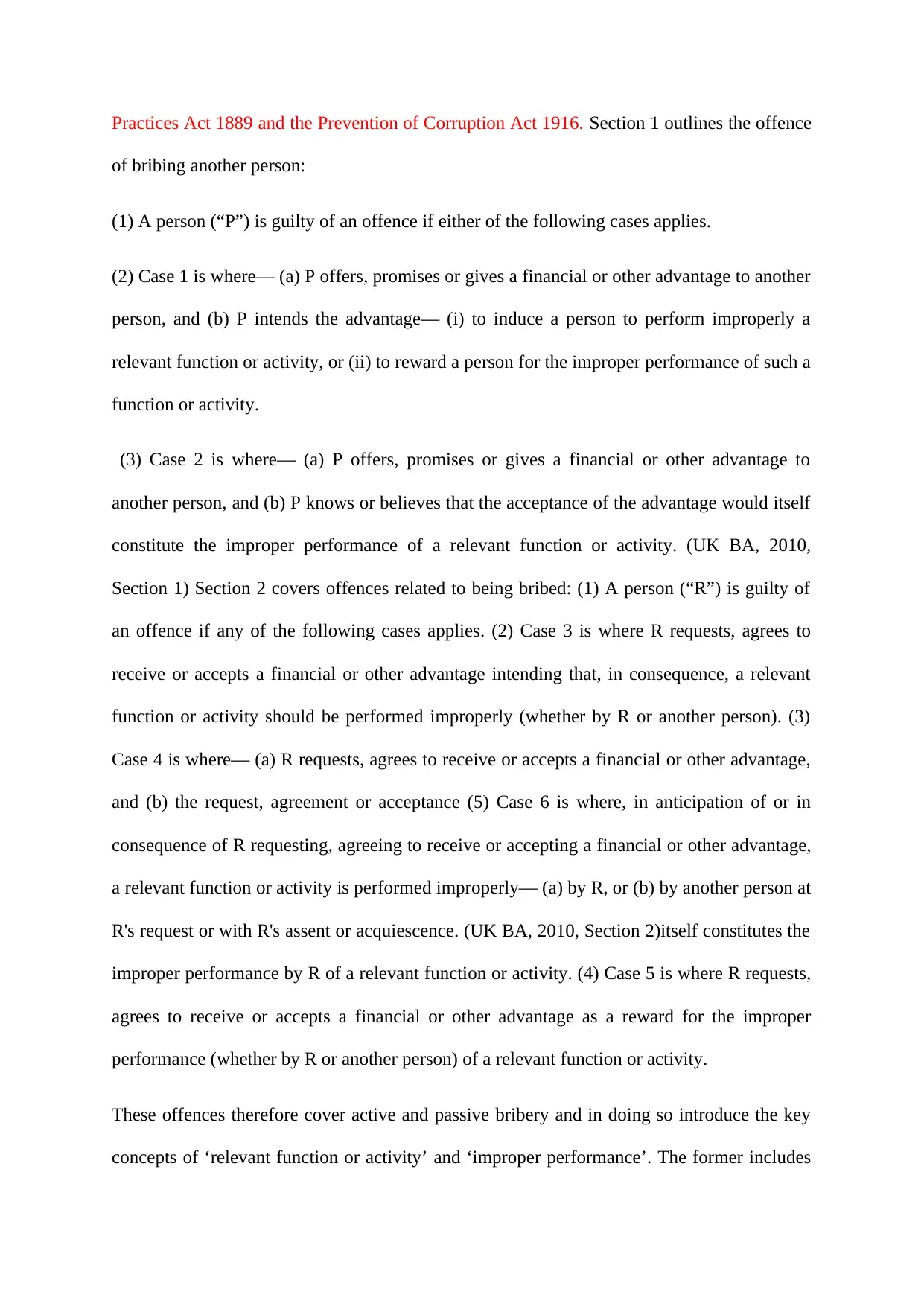
Practices Act 1889 and the Prevention of Corruption Act 1916. Section 1 outlines the offence
of bribing another person:
(1) A person (“P”) is guilty of an offence if either of the following cases applies.
(2) Case 1 is where— (a) P offers, promises or gives a financial or other advantage to another
person, and (b) P intends the advantage— (i) to induce a person to perform improperly a
relevant function or activity, or (ii) to reward a person for the improper performance of such a
function or activity.
(3) Case 2 is where— (a) P offers, promises or gives a financial or other advantage to
another person, and (b) P knows or believes that the acceptance of the advantage would itself
constitute the improper performance of a relevant function or activity. (UK BA, 2010,
Section 1) Section 2 covers offences related to being bribed: (1) A person (“R”) is guilty of
an offence if any of the following cases applies. (2) Case 3 is where R requests, agrees to
receive or accepts a financial or other advantage intending that, in consequence, a relevant
function or activity should be performed improperly (whether by R or another person). (3)
Case 4 is where— (a) R requests, agrees to receive or accepts a financial or other advantage,
and (b) the request, agreement or acceptance (5) Case 6 is where, in anticipation of or in
consequence of R requesting, agreeing to receive or accepting a financial or other advantage,
a relevant function or activity is performed improperly— (a) by R, or (b) by another person at
R's request or with R's assent or acquiescence. (UK BA, 2010, Section 2)itself constitutes the
improper performance by R of a relevant function or activity. (4) Case 5 is where R requests,
agrees to receive or accepts a financial or other advantage as a reward for the improper
performance (whether by R or another person) of a relevant function or activity.
These offences therefore cover active and passive bribery and in doing so introduce the key
concepts of ‘relevant function or activity’ and ‘improper performance’. The former includes
of bribing another person:
(1) A person (“P”) is guilty of an offence if either of the following cases applies.
(2) Case 1 is where— (a) P offers, promises or gives a financial or other advantage to another
person, and (b) P intends the advantage— (i) to induce a person to perform improperly a
relevant function or activity, or (ii) to reward a person for the improper performance of such a
function or activity.
(3) Case 2 is where— (a) P offers, promises or gives a financial or other advantage to
another person, and (b) P knows or believes that the acceptance of the advantage would itself
constitute the improper performance of a relevant function or activity. (UK BA, 2010,
Section 1) Section 2 covers offences related to being bribed: (1) A person (“R”) is guilty of
an offence if any of the following cases applies. (2) Case 3 is where R requests, agrees to
receive or accepts a financial or other advantage intending that, in consequence, a relevant
function or activity should be performed improperly (whether by R or another person). (3)
Case 4 is where— (a) R requests, agrees to receive or accepts a financial or other advantage,
and (b) the request, agreement or acceptance (5) Case 6 is where, in anticipation of or in
consequence of R requesting, agreeing to receive or accepting a financial or other advantage,
a relevant function or activity is performed improperly— (a) by R, or (b) by another person at
R's request or with R's assent or acquiescence. (UK BA, 2010, Section 2)itself constitutes the
improper performance by R of a relevant function or activity. (4) Case 5 is where R requests,
agrees to receive or accepts a financial or other advantage as a reward for the improper
performance (whether by R or another person) of a relevant function or activity.
These offences therefore cover active and passive bribery and in doing so introduce the key
concepts of ‘relevant function or activity’ and ‘improper performance’. The former includes
⊘ This is a preview!⊘
Do you want full access?
Subscribe today to unlock all pages.

Trusted by 1+ million students worldwide
1 out of 25
Related Documents
Your All-in-One AI-Powered Toolkit for Academic Success.
+13062052269
info@desklib.com
Available 24*7 on WhatsApp / Email
![[object Object]](/_next/static/media/star-bottom.7253800d.svg)
Unlock your academic potential
Copyright © 2020–2026 A2Z Services. All Rights Reserved. Developed and managed by ZUCOL.





